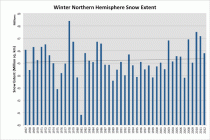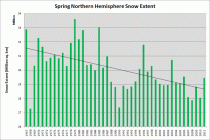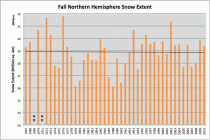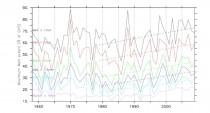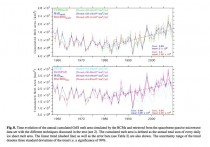By Roger Pielke Sr.
There is an excellent, very informative presentation of Northern Hemisphere snow cover extent and long term trends and variability up to 2010 (Spring and Fall) and 2011 (Winter) from the Rutgers University Global Snow Lab.
As concluded in the 2007 IPCC WG1 report:
“....snow cover [has] declined on average in both hemispheres.”
The reality of the snow cover trends is more complex, however, as clearly illustrated in the figures presented below. Only the spring shows a decline, and, even then, its decline is dominated by the period prior to 1990.
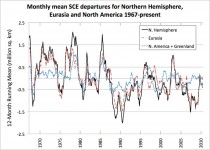
Enlarged.
Figure 1. Twelve-month running anomalies of monthly snow cover extent over Northern Hemisphere lands (including Greenland) as a whole and Eurasia and North America separately between November 1966 and December 2010. Anomalies are calculated from NOAA snow maps. Mean hemispheric snow extent is 25.0 million sq. km. for the full period of record. Monthly means for the period of record are used for 9 missing months between 1968 and 1971 in order to create a continuous series of running means. Missing months fall between June and October, no winter months are missing
By Chris Horner, ATI in the Washington Post
Thank you for acknowledging the University of Virginia’s agreement to provide us certain records under Virginia’s Freedom of Information Act [”Harassing researchers,” editorial, May 30]. Over the past 18 months, U-Va. employed a series of ever-changing rationales to avoid doing so. Of course, like U-Va., The Post failed to articulate an argument grounded in the statute for treating one class of records, or people, differently from the rest of those expressly covered by the act’s terms as a condition of taxpayer-funded employment.
But we take issue with the editorial’s failure to acknowledge a critical point: It is customary among commonwealth universities to provide such records of academics, even the specific class of records we are seeking. For example, U-Va. began providing to Greenpeace records of former research professor Patrick Michaels, before Greenpeace suspended its request. And just this year George Mason University released correspondence of professor Edward Wegman regarding an already published paper, just as we seek former U-Va. assistant professor Michael Mann’s correspondence relating to his publications.
For the uninitiated, Mr. Michaels is a “skeptic.” Mr. Wegman was involved in exposing Mr. Mann’s statistical methods and problems with climate science’s version of peer-review. So their records are somehow different. For The Post to acknowledge this disparate treatment would be to acknowledge that the law is on our side, that the exception sought here is unique to a favored individual, and that this expression of outrage in response to our request is therefore selective and hypocritical.
Christopher Horner, Washington
The writer is director of litigation at the American Tradition Institute’s Environmental Law Center.
By David Whitehouse, GWPF
The Greenland Ice Cap covers 660,000 square miles and is the second largest body of ice in the world. It probably formed a little over 100,000 years ago. Its thickness is usually more than a mile and at its thickest almost two miles. Clearly it is important to monitor it to understand mankind’s effects on our planet, especially when we observe that the largest increases in temperature in recent decades are observed in Arctic regions. If all the ice were to melt sea level would rise by 24 feet.

You don’t have to look far to find popular accounts of the life and times of this vast ice sheet and suggestions that it is melting at a record rate. The ice caps Wikipedia entry is especially unbalanced and alarmist.
A recent paper by Xavier Fettweis et al is interesting in that it has studied near surface melt on the Greenland ice cap since 1979 (when the first satellite-based data became available) comparing two models with microwave observations. When snow melts the percentage of liquid water increases and increases its microwave emissivity. The microwave temperature observed by a satellite is snow temperature multiplied by the emissivity. Fettweis et al says the results are consistent and can be used to extend models before the satellite era.
Looking in detail at their simulations one is struck by several things. One model of ice sheet melt (their Fig 2) looks a lot like HadCrut3 with 1998 being the hottest year, followed by two much cooler years and then a rise to a rough plateau.
Their fig 8 shows the trend in the melting that they say is increasing. Their line is said to show (at the 99% confidence level) a trend in the cumulated melt extent from about 8 million sq km in 1980 to about 18 million sq km in 2010.
The researchers say that the melt recorded in the years 1998, 2003, 2005, and 2007 is unprecedented.
However there is more to this data.
Firstly, I note that there have been no ‘unprecedented’ melt rates since the widely reported warm year 2007. Four ‘unprecedented’ years in nine years (1998 -2007) and then none in the following three since is interesting. Let’s see what 2011 will bring. Is this the start of something or an episode?
Considering their figure 8. Melting was higher than the 1990s and the 1980s, but we need to look on a longer timescale. The 1960 figure is 1.4 million sq km and that might itself not have been the highest as it is possible it was declining at the start of the data. Looking at the graph the recent rise might be counterbalanced by a fall in the earlier part of the data. The start of the trend line is 1979 (presumably the start of satellite-based data) but I would maintain that there is no trend between 1972 - 1996.
That the ice melt extent was declining in 1960 was the conclusion in a previous paper by Fettweis et al showed that the high surface mass loss rates of the Greenland Ice Cap in recent years are not unprecedented when looked at over the past 100 years. The mass loss rates in the 1930s are likely to have been more significant than current rates.
It has been suggested by some that a cynic would use such figures to cast doubt on some people’s assessment of the effect of anthropogenic global warming. It is surprising to me that some seem to think that in matters of such importance a cynical viewpoint is unscientific!
Also, Frauenfeld et al 2011 is an interesting paper that has attracted much discussion. It says that the total extent of Greenland ice melt has been increasing over the past three decades with the greatest melt extent observed in 2007. However they found that the recent period was shorter in duration than a period of high-melt lasting from the early 1920s through to the early 1960s. Although the greatest melt extent in the past 226 years occurred in 2007 it was not statistically significant from 20 other melt years between 1923 - 1961.
So, is the recent decade unusual in the recent life of the Greenland Ice Sheet? The answer is either no, or suggestions to the contrary have not been proven.



